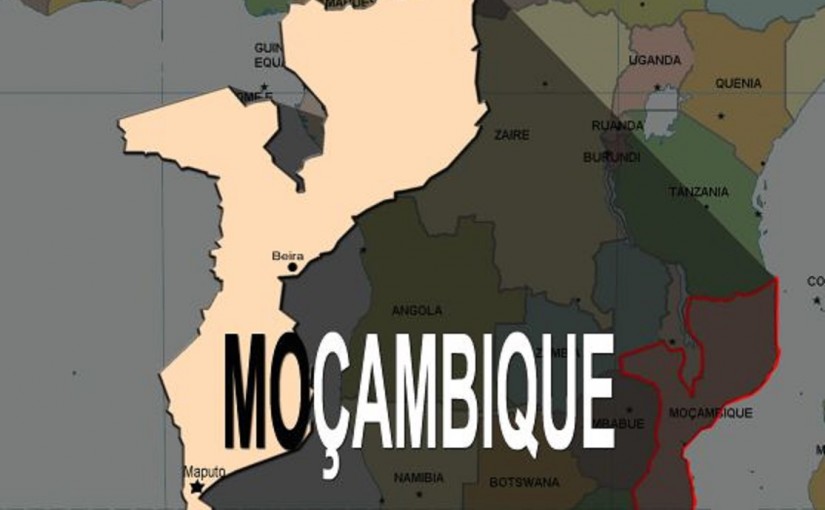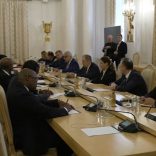Mozambique: Public consultation for “inclusive dialogue” will begin on 6 October
No Renamo governors without cessation of hostilities – Mozambique’s State News Agency

The Mozambican government on Wednesday categorically denied that any provincial governors from the rebel movement Renamo will be appointed in the immediate future.
At a Maputo press conference, former security minister Jacinto Veloso, head of the government delegation on the Joint Commission between the government and Renamo, denied reports in some of the media which implied that the appointment of governors was imminent and did not depend on Renamo ceasing its insurrection in the centre of the country.
“We want to clarify what is really going on, because the news stories circulating may induce Mozambicans and the international community to draw conclusions about a situation which does not exist”, said Veloso.
But it was not surprising that reporters assumed that the appointment of Renamo provincial governors was a done deal. For on Wednesday morning the Joint Commission issued a statement which said that “legal mechanisms should be found for the provisional appointment of provincial governors from Renamo as soon as possible”. That statement said nothing at all about disarming the Renamo militia or a cessation of hostilities.
Veloso said that the term “as soon as possible” was “perhaps a mistake”, and had entered the statement because it was the term used by the foreign mediators at the talks.
“But it is clear that ‘as soon as possible’ does not mean in a month’s time”, he added. “It is still necessary to look at what these governors are going to do. What are they going to govern with? How? With what programme? While this is not defined there is no chance of appointing any governor”.
Renamo is insisting on the right to rule six central and northern provinces (Sofala, Manica, Tete, Zambezia, Nampula and Niassa) where it says it won the October 2014 general elections. Veloso stressed that the term “Governance of the six provinces by Renamo” was merely an agenda point in the talks, and did not mean that six provinces are about to be handed over to the rebels.
“If anyone says that the government has already agreed to appoint governors from Renamo for the six provinces, this conclusion is absolutely wrong”, Veloso stressed. “It’s not true. There is this hypothesis. But nobody has said that it is certain. ‘Six provinces’ is the title of an agenda point”.
So how many provinces might be delivered to Renamo governors? “It could be no provinces, it could be two, it could be five, it even could be more, if that’s in the national interest”. He insisted that the Joint Commission is working “not in the interest of Renamo, nor in the interest of Frelimo, but in the national interest”.
Furthermore, there was no question of deciding on the issue of provincial governors in isolation. All the points on the agenda are of equal importance, said Veloso. This includes a cessation of hostilities and the disarming of Renamo. “This is a series of points that have to be implemented, once they are agreed in full”, he added.
The final agreement, he stressed, would not come from the Joint Commission, but from the long awaited face-to-face meeting between President Filipe Nyusi and Renamo leader Afonso Dhlakama.
“The mandate of the commission is to prepare the agreement, and prepare the high level meeting”, Veloso said.
The Wednesday morning statement also said a sub-commission will draw up constitutional amendments and new or amended legislation on such matters as provincial finances and the provincial assemblies. This draft legislation should be ready for submission to the country’s parliament, the Assembly of the Republic, “by the end of November”.
But Veloso declared that this deadline, of three and a half months, was “unrealistic”. There are seven items for the sub-commission to consider, all of them complex.
The government delegation, Veloso said, had noted inside the Joint Commission that the end of November deadline could not be met.
“But Renamo and the mediators said it’s better to leave it as it is, and during its work the Commission must check that this is not possible”, he continued. “On this basis, we agreed. If the commission knows, we can leave it in, but in the knowledge that it is unrealistic. We said that, and it’s in the minutes”.
So when would the package of new legislation and constitutional amendments go before parliament? “We don’t know”, Veloso said. “It depends on how much time it takes to draft the legislative packages”.
The next point on the Joint Commission’s agenda is a cessation of hostilities. Veloso said the government delegation has already proposed that this be taken in two parts – first “an immediate suspension of all armed actions”, which it regarded as “essential” to allow discussions to continue on the remaining agenda points.
This would be followed by a definitive cessation of hostilities, to be announced at the meeting between Nyusi and Dhlakama.
This would be the second agreement on ending hostilities within the space of about two years. On 5 September 2014, Nyusi’s predecessor, Armando Guebuza, signed such an agreement with Dhlakama, under which the Renamo insurrection should have ended, and all Renamo fighters should have been demobilized.
Renamo never implemented this 2014 agreement. Not a single Renamo fighter was demobilised or disarmed, and Renamo resumed its military activities as from February 2016.













Leave a Reply
Be the First to Comment!
You must be logged in to post a comment.
You must be logged in to post a comment.